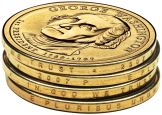2009 News of the Nation - Economy in Turmoil

Major U.S. news stories from the recession to same-sex marriage
Same-Sex Marriage Legislation | Obama's First Year | First Hispanic Justice | Fort Hood Shooting | Supreme Court Rules on DNA Testing | Health-Care Reform Tops Agenda An Economy in Turmoil Shows Improvement by Year's EndBankruptcies and Unemployment Continue In February, President Obama signed a $787 billion stimulus package into law, with the hope that the money would help to create 3.5 million jobs for out-of-work and underemployed Americans and help pull the U.S. out of recession. Job creation, however, proved elusive for much of the year. By October, the unemployment rate reached 10.2%, the highest level in 26 years, though a broader measure tracked by the Labor Department, which includes unemployed, underemployed, and discouraged workers, stood at 17.5%. The outlook improved by December, when the unemployment rate dipped to 10% and the number of jobs lost was just 11,000, down considerably from a January high of 741,000. Incentives to Buy First-time homebuyers were also given a purchase incentive in the form of an $8,000 tax credit. Homeowners who had been in their homes for at least five years were also entitled to a tax credit when buying a new house. Meanwhile, an extension of unemployment benefits provided a boost to Americans who had been out of work for an extended period of time. Benefits to the unemployed were extended by 14 weeks across the country, and by an additional six weeks for those who lived in states with unemployment rates higher than 8.5%. Despite these incentives, many Americans complained that the government was more focused on propping up Wall Street while those on Main Street continued to languish in the economic morass. For more information about the economy: |
- More from 2009 News of the Nation









